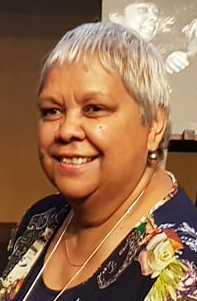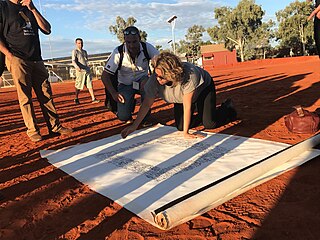Vibe Australia was an Aboriginal media, communications, and events management agency founded by Gavin Jones in 1993. Located in Darlinghurst, Sydney, New South Wales, they worked with Aboriginal and Torres Strait Islander people throughout Australia. The organisation was known for hosting The Deadly Awards, as well as running the music and culture radio show Deadly Sounds. It also published the website and magazine Deadly Vibe, and hosted an annual national music and sporting event called The Vibe 3on3 for Indigenous Australians.
NAIDOC Week is an Australian observance lasting from the first Sunday in July until the following Sunday. The acronym NAIDOC stands for National Aborigines and Islanders Day Observance Committee. NAIDOC Week has its roots in the 1938 Day of Mourning, becoming a week-long event in 1975.
Indigenous Australian self-determination, also known as Aboriginal Australian self-determination, is the power relating to self-governance by Aboriginal and Torres Strait Islander peoples in Australia. It is the right of Aboriginal and Torres Strait Islander peoples to determine their own political status and pursue their own economic, social and cultural interests. Self-determination asserts that Aboriginal and Torres Strait Islander peoples should direct and implement Aboriginal and Torres Strait Islander policy formulation and provision of services. Self-determination encompasses both Aboriginal land rights and self-governance, and may also be supported by a treaty between a government and an Indigenous group in Australia.

The Redfern Park Speech, also known as the Redfern speech or Redfern address, was made on 10 December 1992 by the then Australian Prime Minister, Paul Keating, at Redfern Park, which is in Redfern, New South Wales, an inner city suburb of Sydney. The speech dealt with the challenges faced by Indigenous Australians, both Aboriginal Australian and Torres Strait Islander peoples. It is still remembered as one of the most powerful speeches in Australian history, both for its rhetorical eloquence and for its ground-breaking admission of the negative impact of white settlement in Australia on its Indigenous peoples, culture and society, in the first acknowledgement by the Australian Government of the dispossession of its First Peoples. It has been described as "a defining moment in the nation's reconciliation with its Aboriginal and Torres Strait Islander people".

Samuel William Watson, also known as Sammy Watson Jnr, was an Aboriginal Australian activist from the 1970s, who in later life stood as a Socialist Alliance candidate. He is known for being a co-founder of the Australian Black Panther Party in 1971/2. Through work at the Brisbane Aboriginal Legal Service in the early 1990s, Watson was involved in implementing the findings of the Royal Commission into Aboriginal Deaths in Custody. From 2009 was deputy director at the Aboriginal and Torres Strait Islander Studies Unit at the University of Queensland.

National Indigenous Television (NITV) is an Australian free-to-air television channel that broadcasts programming produced and presented largely by Aboriginal and Torres Strait Islander people. It includes the six-day-a-week NITV News Update, with programming including other news and current affairs programmes, sports coverage, entertainment for children and adults, films and documentaries covering a range of topics. Its primary audience is Indigenous Australians, but many non-Indigenous people tune in to learn more about the history of and issues affecting the country's First Nations peoples.
Indigenous Australians are people with familial heritage from, and/or recognised membership of, the various ethnic groups living within the territory of present day Australia prior to British colonisation. They consist of two distinct groups, which includes many ethnic groups: the Aboriginal Australians of the mainland and many islands, including Tasmania, and the Torres Strait Islanders of the seas between Queensland and Papua New Guinea, located in Melanesia.
Ernestine Bonita Mabo, was an Australian educator and activist for Aboriginal Australians, Torres Strait Islanders, and Australian South Sea Islanders. She was the wife of Eddie Mabo until his death in 1992.

Jacqueline Gail "Jackie" Huggins is an Aboriginal Australian author, historian, academic and advocate for the rights of Indigenous Australians. She is a Bidjara/Pitjara, Birri Gubba and Juru woman from Queensland.

The Aboriginal Centre for the Performing Arts (ACPA) is a national Australian institution for the culturally sensitive training of Aboriginal Australian and Torres Strait Islander people in the performing arts. Founded in 1997, it has been located in Fortitude Valley, Brisbane, since 2017.
First Contact is an Australian reality television documentary series that aired on SBS One, SBS Two and NITV from November 2014. A second season aired in 2016. The show, produced by Blackfella Films and presented by Ray Martin, takes six European Australians on a journey across Australia, challenging their preconceived ideas about Indigenous Australians. In the second season, the non-Indigenous participants are all well-known Australians.
The Closing the Gap framework is a strategy by the Commonwealth and state and territory governments of Australia that aims to reduce disparity between Aboriginal and Torres Strait Islander peoples and non-Indigenous Australians on key health, education and economic opportunity targets. The strategy was launched in 2008 in response to the Close the Gap social justice movement, and revised in 2020 with additional targets and a refreshed strategy.
Wayne Denning is an Indigenous Australian businessman of Birri Gubba heritage, and is the Managing Director and owner of Carbon Creative.

The Uluru Statement from the Heart is a 2017 petition to the people of Australia, written and endorsed by the Australian Aboriginal and Torres Strait Islander leaders selected as delegates to the First Nations National Constitutional Convention. The document calls for substantive constitutional change and structural reform through the creation of two new institutions; a constitutionally protected First Nations Voice and a Makarrata Commission, to oversee agreement-making and truth-telling between governments and First Nations. Such reforms should be implemented, it is argued, both in recognition of the continuing sovereignty of Indigenous peoples and to address structural power differences that has led to severe disparities between Indigenous and non-Indigenous Australians. These reforms can be summarised as Voice, Treaty and Truth.
Kirstie Parker is a Yuwallarai journalist, policy administrator and Aboriginal Australian activist. From 2013 to 2015 she served as the co-chair of the National Congress of Australia's First Peoples and during her tenure pressed for policies that allowed Aboriginal and Torres Strait Islander Australians to gain the ability for self-determination.
Close the Gap (CTG) is a social justice campaign focused on Indigenous Australians' health, in which peak Aboriginal and Torres Strait Islander and non-Indigenous health bodies, NGOs and human rights organisations work together to achieve health equality in Australia. The Campaign was launched in April 2007. National Close the Gap Day (NCTGD) has been held annually since 2009.

The Aboriginal and Torres Strait Islander Voice, also known as the Indigenous Voice to Parliament, the First Nations Voice or simply the Voice, was a proposed Australian federal advisory body to comprise Aboriginal and Torres Strait Islander people, to represent the views of Indigenous communities.
Constitutional recognition of Indigenous Australians refers to various proposals for changes to the Australian Constitution to recognise Indigenous Australians in the document. Various proposals have been suggested to symbolically recognise the special place Indigenous Australians have as the first peoples of Australia, along with substantial changes, such as prohibitions on racial discrimination, the protection of languages and the addition of new institutions. In 2017, the Uluru Statement from the Heart was released by Indigenous leaders, which called for the establishment of an Indigenous Voice to Parliament as their preferred form of recognition. When submitted to a national referendum in 2023 by the Albanese government, the proposal was heavily defeated.
Chelsea Joanne Ruth Watego is an Aboriginal Australian academic and writer. She is a Mununjali Yugambeh and South Sea Islander woman and is currently Professor of Indigenous Health at Queensland University of Technology. Her first book, Another Day in the Colony, was published in 2021.






